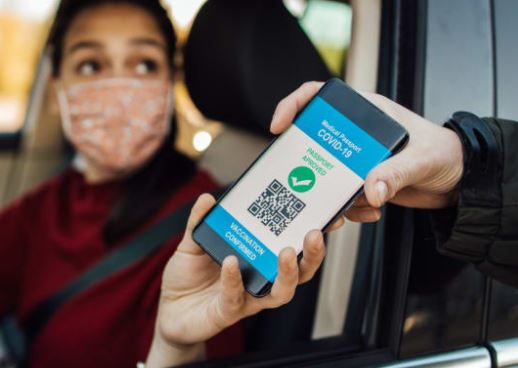Employers that want to ask employees about their vaccination status should make questionnaire or survey inquiries in a targeted way so employees don’t disclose disability-related information.
Under the Occupational Safety and Health Administration’s emergency temporary standard, currently being reviewed by the U.S. Supreme Court, employers with at least 100 workers have until Jan. 10 to determine the vaccination status of each employee.
“Don’t ask one question too many,” cautioned Scott Cruz, an attorney with Greensfelder in Chicago. He said employers that ask employees why they aren’t getting vaccinated arguably are asking a disability-related question prohibited by the Americans with Disabilities Act.
“Employers are entitled to know who among their employees is vaccinated so they can protect their workforce and help ensure a safe work environment,” said Jessica Brown, an attorney with Gibson Dunn in Denver. “But there are risks to asking too many questions and the wrong questions relating to vaccination status.”
Targeted Inquiry
Erin McLaughlin, an attorney with Buchanan, Ingersoll & Rooney in Newark, N.J., and Pittsburgh, said a targeted inquiry might involve asking how employees would categorize themselves as it pertains to the COVID-19 vaccine:
- Fully vaccinated; will provide required confirmation.
- Partially vaccinated; will provide confirmation when fully vaccinated.
- Not yet vaccinated but intending to get vaccinated.
- Not intending to be vaccinated due to a medical or religious reason.
- Not intending to be vaccinated and do not have a medical or religious reason.
“The questionnaire or survey should include a statement that [says] the employee should not provide any other medical or genetic information in response to the inquiry,” McLaughlin said.
Identify a date by which employees need to be vaccinated, if vaccination is required, Cruz said. Give a deadline for providing vaccination status, the first dose deadline date and the fully vaccinated date, he said.
Bob Nichols, an attorney with Bracewell in Houston, said an employer “should avoid structuring the questions as to invite an explanation for the employee’s position” and recommended survey questions that call for a “yes” or “no” response.
Nonetheless, “employers should be prepared for more vaccine exemption requests after surveying the unvaccinated workforce,” said Ian Carleton Schaefer, an attorney with Loeb & Loeb in New York City.
“Soliciting unvaccinated employees to share their future vaccine intentions could trigger employees to divulge why they are not vaccinated,” he said. To the extent those reasons are protected—a medical condition such as a disability or pregnancy, or a sincerely held religious belief—an employer “would be on notice of its obligation to engage in an interactive process and provide a reasonable accommodation, unless doing so would pose an undue hardship,” Schaefer said.
“Employers must maintain records related to vaccination status as confidential and stored separately from the employee’s personnel files,” McLaughlin said.
Explanation of Why the Employer Wants to Know
There is no required language on how employers should phrase their requests for information on whether employees have been or will be vaccinated, McLaughlin noted. But, she said, “I like language that explains why the employer is collecting the information and limits the responses an employee can submit.”
For example, she has used the following language:
“As always, the health and safety of our employees remains our top priority, and the return to a safe office environment goes hand in hand with that value. As we continue to plan for the reopening of the office, it is important that we gain additional information pertaining to the COVID-19 vaccine. We would like to begin determining who is and is not vaccinated, and who will and will not be vaccinated when we return. This will ensure we continue to take all the necessary precautions as we reopen the office.
“In order to collect this information, we are asking that you simply respond to the inquiry … as it pertains to the COVID-19 vaccine and do not provide any additional medical or genetic information. Please forward your response to [insert name] no later than [date]. If you prefer to communicate with [insert name] in some other fashion, please contact him/her directly. This will ensure the highest level of confidentiality is being maintained.”
Keep This in HR’s Hands
McLaughlin prefers using a written survey so long as it is not anonymous, “as employers will want to know which employees fall within each bucket for planning purposes.” Whether employers use a questionnaire or survey may depend on the employer and workforce, Cruz said, noting that a blue-collar workforce may not have access to e-mail.
McLaughlin said HR is best positioned to make the inquiry, collect the information and maintain it consistent with other medical records confidentially and apart from the employee’s personnel file.
“Supervisors should not be involved in these inquiries and should be trained not to have casual conversations about vaccination status,” McLaughlin said.
Some employees view vaccination as a badge of honor and volunteer their vaccination status to their supervisors, Cruz noted. “Remind supervisors that if an employee discloses vaccine status, it remains confidential information” that should not be disclosed, he said.
What if employees refuse to tell employers their vaccination plans? If the employee is in violation of an employee directive, the employer should address the refusal like any other act of insubordination, Cruz said.
